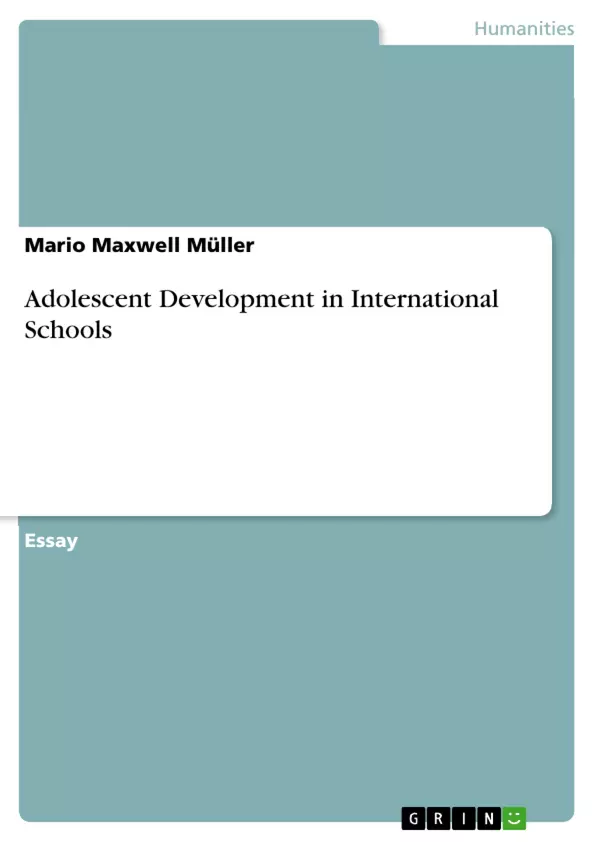The following essay will discuss the importance of adolescent development within an international school setting. The norms within an International Baccalaureate school are given that teachers and educators are trained accordingly to the needs as outlined by the International Baccalaureate organisation, where a focus is placed on inquiry-based learning, assessments, student agency, and how to promote international mindedness, allowing students to learn through making connections within a global context while being knowledgeable, caring, risk-takers and open-minded.
The essay is divided into three sections, including personal experiences, how these link to theorists, and the educational implications. By focusing on the interpersonal and intrapersonal relationships between staff and colleagues, one can easily promote high levels of engagement and excellent communication channels by being professional and showing awareness for respect, dignity and appreciation for hard work, wherever your team might be in their learning experiences.
Inhaltsverzeichnis (Table of Contents)
- Abstract
- Introduction
- Part 1 - Discussion of personal experiences
- Part 2 - Connecting personal experiences to theories that were discussed
- Part 3 Educational Implications
Zielsetzung und Themenschwerpunkte (Objectives and Key Themes)
This essay examines the significance of adolescent development within an international school setting, particularly focusing on the framework of the International Baccalaureate (IB) program. It explores the author's personal experiences as an adolescent in an international school, connecting them to relevant theories, and highlighting the educational implications for fostering student growth and success within this context.
- Adolescent development in international school settings
- The role of the International Baccalaureate (IB) program
- Connecting personal experiences to relevant theories
- Educational implications for student growth and success
- Importance of inquiry-based learning, student agency, and international mindedness
Zusammenfassung der Kapitel (Chapter Summaries)
The essay begins by discussing the author's own experiences as an adolescent, highlighting challenges in communication and social skills. It explores how his religious upbringing and personality influenced his interactions with peers and teachers. The author emphasizes the importance of self-management, social skills, and the role of education in shaping his academic and personal growth.
The second part connects the author's personal experiences to educational theories, emphasizing the evolving role of technology in education. The author discusses the importance of computer literacy and how integrating technology effectively can enhance student learning. He refers to theories of technology integration and its role in fostering student competency in the 21st century.
The final part explores the educational implications of the author's experiences, highlighting the importance of teacher support and collaboration in fostering student development. The essay emphasizes the significance of inquiry-based learning, critical thinking, and communication skills in an IB environment.
Schlüsselwörter (Keywords)
The key terms and concepts explored in this essay include adolescent development, international school setting, International Baccalaureate (IB), personal experiences, educational theories, technology integration, 21st-century skills, inquiry-based learning, student agency, and international mindedness.
Frequently Asked Questions
What is the focus of adolescent development in IB schools?
The focus is on inquiry-based learning, student agency, and promoting international mindedness, helping students become knowledgeable, caring, and open-minded risk-takers.
How does an international school environment affect social growth?
It encourages students to make connections in a global context and develop interpersonal skills through interactions with a diverse community of peers and educators.
What are the educational implications for teachers in these schools?
Teachers must be trained to support inquiry-based learning and foster a professional environment based on respect, dignity, and awareness of diverse learning experiences.
Why is technology integration important for modern students?
Computer literacy and effective technology integration are considered essential 21st-century skills that enhance learning and prepare students for a globalized world.
What role does "student agency" play in the IB framework?
Student agency gives students more voice and choice in their learning process, encouraging them to take responsibility for their academic and personal development.
- Arbeit zitieren
- Dr. Mario Maxwell Müller (Autor:in), 2022, Adolescent Development in International Schools, München, GRIN Verlag, https://www.grin.com/document/1292436



